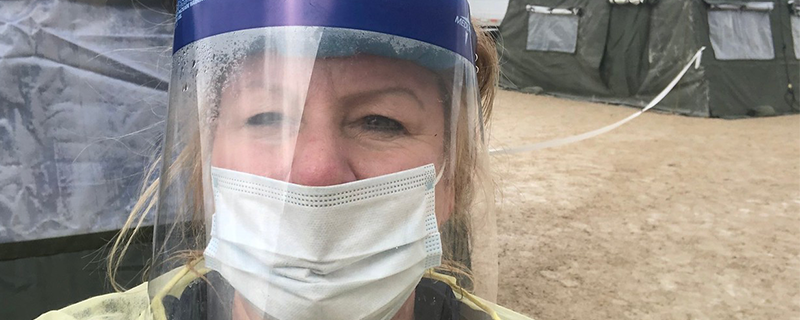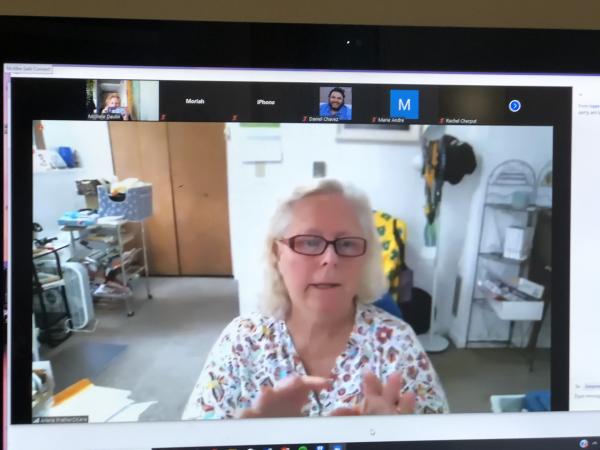On the Front Lines
 Every day, living with the reality of the COVID-19 pandemic in spring 2020 seemed to bring new understanding, new challenges and new questions. And as the wave moved from the coasts inland, the intensity and the need for answers and assistance grew.
Every day, living with the reality of the COVID-19 pandemic in spring 2020 seemed to bring new understanding, new challenges and new questions. And as the wave moved from the coasts inland, the intensity and the need for answers and assistance grew.
UNI public health faculty, staff and students lent their support, whether helping dispel myths with friends and family, volunteering at the local food bank, or even working as essential workers in part-time jobs.
Others, like professors Michele Devlin and Catherine Zeman provided both leadership  and counsel in multiple ways. Both were part of an early panel to educate the UNI community on COVID-19. Zeman, whose emphasis is environmental health, serves on the Black Hawk County Board of Health. Devlin is also a trained EMS responder and member of various response teams. As part of the Iowa Disaster Medical Assistance team, she helped conduct more than 400 COVID-19 tests among employees of meatpacking plants in northeast Iowa. In May, she headed to the Navajo Nation as a member of Team Rubicon, a large national non-profit disaster organization made up of veterans and first responders. (Read more: UNI public health professors help fight COVID-19)
and counsel in multiple ways. Both were part of an early panel to educate the UNI community on COVID-19. Zeman, whose emphasis is environmental health, serves on the Black Hawk County Board of Health. Devlin is also a trained EMS responder and member of various response teams. As part of the Iowa Disaster Medical Assistance team, she helped conduct more than 400 COVID-19 tests among employees of meatpacking plants in northeast Iowa. In May, she headed to the Navajo Nation as a member of Team Rubicon, a large national non-profit disaster organization made up of veterans and first responders. (Read more: UNI public health professors help fight COVID-19)
Closer to home, Devlin also serves as the public health consultant and technical advisor, pro bono, for EMBARC, the state's nonprofit that serves the needs of refugees at four sites in Iowa, including Waterloo. Many work in meatpacking plants in the region.
“They (EMBARC) are doing amazing work trying to help these refugees that are disproportionately affected by COVID-19,” Devlin says. She helped with training interpreters about COVID-19 and advising on policy and operational issues. She also teamed up with Zeman and Arlene Prather O’Kane, an alumna (M.A., ‘10) in youth and human services, to coordinate a new service.
“One of the really cool things is we helped them set up a 24/7 virtual case worker and medical hotline for the refugees. I trained their staff, and then I am one of the EMTs/nurses that provide virtual services and try to help them medically over the phone with questions,” she says.
 Devlin had reached out to Prather O’Kane, who also has a nursing background, to see if she might be interested in volunteering at EMBARC. Prather O’Kane had retired after 20 years of service with the Black Hawk County Health Department in 2016. Recently she has been working as a PRN RN with Pathways Behavioral Health Services detox unit in Waterloo. She welcomed Devlin’s suggestion as she’d been unable to provide direct patient care since she and her husband are in high risk categories for the coronavirus.
Devlin had reached out to Prather O’Kane, who also has a nursing background, to see if she might be interested in volunteering at EMBARC. Prather O’Kane had retired after 20 years of service with the Black Hawk County Health Department in 2016. Recently she has been working as a PRN RN with Pathways Behavioral Health Services detox unit in Waterloo. She welcomed Devlin’s suggestion as she’d been unable to provide direct patient care since she and her husband are in high risk categories for the coronavirus.
“I have actually known about EMBARC for many years, since I would attend Coalition meetings for my job as a manager at the Black Hawk County Health Department,” she says. “I have always liked working with the refugee and immigrant population locally.”
Her voluntary role soon turned into a part-time position. As of May 1, she became a part-time medical assessment coordinator and caseworker at EMBARC, overseeing the virtual healthcare team of registered nurses and emergency medical technicians. She helped train the EMBARC interpreters about COVID-19 and HIPAA privacy and confidentiality policies so they could help relay health information to the families they work with.
On the phone, Prather O’Kane has answered medical questions about issues like returning to work after COVID-19 and signing up for disability. She has coordinated three-way phone calls involving the caller, interpreter and herself.
She says having this opportunity to help these families means a lot, as a member of Black Hawk County and as a nurse. “Since I am not able to serve with my nursing experience on the ‘front lines,’ the opportunity to be able to still utilize my skills and experiences working with EMBARC is, I believe, a ‘God-incidence.’ I am glad to share my knowledge and expertise with others,” she says.
Sharing has also meant voluntarily making masks and face shields at her home and delivering them. “By doing this service, I can still feel "safe" from the virus, promote safety for others and feel that I can do my part during this time,” she adds.
In addition to taking her turn with rotational shifts for the 24/7 coverage, Zeman, along with Devlin, worked to keep the hotline team apprised of new developments, epidemiological trends, new virology information, and new trends in treatment. As spring turns into summer, the hotline remains a critical resource for many.
“The EMBARC 24/7 line will continue to be a resource for any newcomer/immigrant who has questions concerning COVID-19 health issues,” says Zeman.
Related stories:
"A Mix of Crazy and Reminder of the Good'
Creating a Social Community
Coping with Stress: Let's Talk
